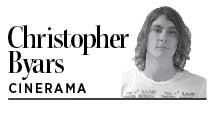Romances that capture the comedy and tragedy of love
The new film Valentine’s Day, which opens today, offers audiences “a day in the life of love,” but, as most could easily predict, the film will not be offering anything new.
Most Hollywood films about romance tend toward the same dull conventions of narrative and form — as is the case with Valentine’s Day. This is particularly unfortunate because, as entertaining as they might be, most modern romantic films really have nothing to offer other than a fantasy of living happily ever after, which becomes painfully tiresome in adaptation after adaptation.
With so many films held to contemporary Hollywood’s rigid standards — excluding last year’s (500) Days of Summer — it can be quite refreshing to take a look at other depictions of romance that are often neglected.
Here are five films about love that evoke laughs, irritation, sentiment, insanity and even tragedy, all the while being through and through romantic.
The Rules of Attraction satirically depicts the death of romance in a college environment. Director Roger Avary’s film follows the lives of three liberal arts students who find themselves involved in a love triangle that is dominated by sexual desire and regards the idea of romantic love as archaic.
James Van Der Beek steals the film by giving the performance of his career as a hopeless romantic who has sex with any girl he can, even though he believes himself to be in love with only one. His character tries his best to embrace romance, but, by existing in a society that promotes endless promiscuity, circumstance prevents him from ever learning how to love.
Hannah and Her Sisters, which earned writer-director Woody Allen an Oscar for its screenplay, portrays the love lives of three sisters who, over the course of a year, all end up swapping lovers. The film brilliantly conveys the confusion and erratic decisions so often made while in love, but it does so in a comical manner that allows audiences to laugh even at the most depressing aspects of love.
An ensemble cast, featuring Allen, Mia Farrow and Michael Caine, honestly relates loss with discovery by following relationships that fall apart and the work that must be done in order to overcome the confusion surrounding the art of making love last.
Shampoo features Warren Beatty as a male hairdresser who is in love with all women. He only went to beauty school in order to be around them, but, as the film progresses, a love triangle easily shatters his ultimate desire of being loved by every woman he meets. The beauty behind this classic is its ability to mix both comedy and actual drama to expose the real immaturity behind stubborn romantic perspectives.
Robert Towne’s brilliant script places Beatty’s character in some of the most ironic and painfully funny circumstances, the best of which involves him in bed with one woman, whom he suddenly leaves to go to bed with another — all the while satirizing his real-life notoriety as a Hollywood stud of the 1970s.
David Lynch’s Wild at Heart is one of the most intense and insane love stories ever told. Nicholas Cage and Laura Dern play two lovers on the run from hired killers, mobsters and a very pragmatic matriarch as they continuously find themselves in bizarre adventures all so they can love one another.
Cage’s character, a violent ex-con who is obsessed with Elvis, battles some of the most sinister characters imaginable in a film filled with exploitative sex and violence that eerily weaves in a sinister motif resembling The Wizard of Oz.
Finally, one of the most underrated romantic films ever made is Vincent Gallo’s comedy Buffalo ’66. Just released from prison, Gallo’s character kidnaps a girl and forces her to pretend to be his girlfriend in front of his incredibly disturbed parents before he plans to murder the man responsible for his imprisonment.
As he falls for his hostage, the film’s humor derives from Gallo’s ability to express every embarrassing emotion with such perfection that he literally personifies every romantic sentiment through his manic behavior.
Gallo, who also wrote and directed the film, embodies every stupid and resentful mistake ever made in the game of love. His outbursts openly contrast with his ability to be genuine.
These films are all love stories, but the difference between them and Valentine’s Day is that in the other films romance is propelled through the turbulence of life by (often comical) misfortunes.
These outlandish interpretations of romance actually promote more humanism and provide a much more relatable experience because the characters in these films all have intentions of finding true romance, just like the rest of us, they have just as hard a time accomplishing it.
